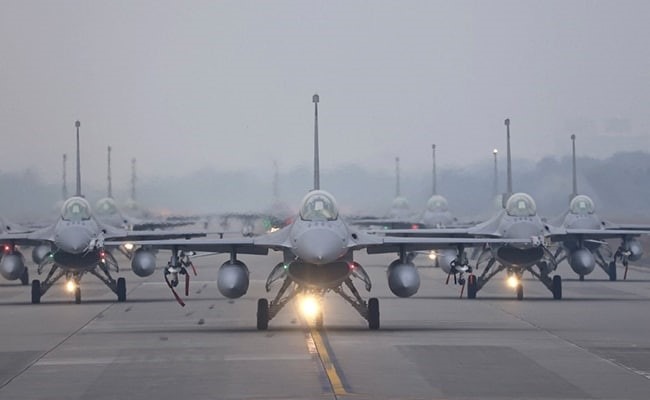| Translate This News In |
|---|
According to a study by the military-owned body that makes the weapons, Taiwan is developing missiles that can attack enemy air bases and bring down cruise missiles, as well as drones that can target their launching locations.
Taiwan approved T$240 billion ($8.20 billion) in additional military spending over the next five years last year, as tensions with China, which claims the island as its own territory, have reached a new high and Chinese military planes have repeatedly flown through Taiwan’s air defence identification zone.
Taiwan expects to more than double its yearly missile production capacity to close to 500 this year, according to the island’s defence ministry, as it increases its military capabilities.
The military-owned National Chung-Shan Institute of Science and Technology provided more specifics on what the missiles and drones it is developing may achieve in a battle in a report to parliament this week, a copy of which was read by Reuters.
The Hsiung Sheng land-attack missile, which experts believe has a range of up to 1,000 kilometres, is available in two versions: one with a high-explosive warhead to target bunkers and hardened command centres, and another with “dispersal” munitions to target airfield facilities, according to the company.
According to Chieh Chung, a researcher at Taipei’s National Policy Foundation, the Hsiung Sheng could reach most locations under the People’s Liberation Army’s Eastern Theatre Command, including those in Shanghai and Zhejiang province.
It might considerably increase the national army’s ability to slow or paralyse the Communist forces’ tempo of an invasion of Taiwan, making it difficult for them to achieve a swift war,” he warned.
The sophisticated Sky Bow III surface-to-air missile is designed to knock out ballistic and cruise missiles, as well as fighter jets.
Taiwan’s plans predate Russia’s invasion of Ukraine, but the war has generated discussions about the lessons Taiwan may employ to repel a Chinese attack, particularly how Ukraine has fought a numerically superior force.
According to one Western security source located in Taiwan, while Taiwan is receiving equipment from the US, such as Harpoon anti-ship missiles, the island’s own missile programme will assist assure the island does not have to rely on foreign supply, as Ukraine has.
“It’s a hedging tactic,” the insider added on the condition of anonymity.
According to the university, drones, which Ukraine has deployed well against Russia’s military, might attack enemy missile launch locations or operate as decoys to help pinpoint enemy radars.
It stated that four new facilities, including bases and maintenance plants, would be established by 2025 for the new drones.
The defence ministry earlier declared plans to begin manufacturing unidentified “attack drones,” with a yearly production target of 48 such aircraft.
Little is known about the drones made in the United States. The first batch of US-made MQ-9 Reaper drones, which can be armed with missiles and operate at great range, will enter service with Taiwan by 2025, according to the defence ministry last month.
Approximately 64 percent of Taiwan’s additional military spending, which comes on top of T$471.7 billion in planned military spending for 2022, will be spent on anti-ship weapons such as land-based missile systems, including a T$148.9 billion plan to mass-produce homegrown missiles and “high-performance” ships.
Taiwanese President Tsai Ing-wen has made military modernization a primary priority, pushing for initiatives such as a new class of stealthy warships and indigenous submarines.
Tsai has advocated for “asymmetric warfare,” or the development of high-tech, mobile weapons that are difficult to destroy and can deliver precise attacks.
Taiwan says that China has thousands of missiles directed at its territory, and that Chinese forces outweigh Taiwan’s. Taiwan does not have nuclear weapons, although China does.
China has never ruled out using force to retake control of the democratic island.


















